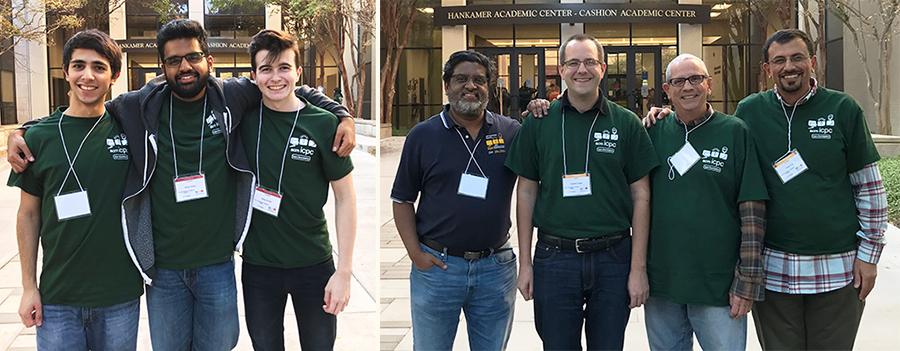
Left to right: Daniel Talamas (senior), Arnav Sastry (senior), Ethan Arnold (junior), Vallath Nandakumar (lecturer, ECE), Etienne Vouga (assistant professor, CS), Glenn Downing (lecturer, CS), and Fares Fraij (lecturer, CS).
On Sat, 4 Nov 2017, the UT Competitive Programming team won the ACM-ICPC South Central USA Regional Competition at Baylor University in Waco, Texas. The winning team, consisting of Arnav Sastry (senior), Daniel Talamas (senior), and Ethan Arnold (junior), will compete in the ACM-ICPC World Finals this coming April in Bejing, China.
The competition consisted of 70+ teams from 25+ schools (approx. 225 students) from across Texas, Louisiana, and Oklahoma. UT Austin's top team solved ten problems, more than any other team. Due to technical problems with the automated contest judge, the final rankings of the other teams are still uncertain; provisionally UT Dallas came in 2nd and solved nine problems, and Texas A&M came in 3rd and solved eight problems. UT Austin's other three teams came in 5th (Aditya Durvasula, Ho-Jae Jung, Jie Hao Liao), 8th (Alex Meed, Celik Savk, Supawit Chockchowwat), and 17th (Alex Hong, Hoang Dinh, Miguel Obregon).
UT has been competing in the Regionals since 1997. In 2014, one of the four teams took 2nd place. In 2015, one of the four teams took 2nd place again. In 2016, the four teams swept the regionals with 1st, 2nd, 3rd, and 4th place. The UT team has seen marked improvement since the creation of a new elective, CS104c: Competitive Programming, taught by the faculty coaches Etienne Vouga and Glenn Downing and the student officers of the UT Competitive Programming Club.
The ACM International Collegiate Programming Contest (ICPC) is the premier global programming competition conducted by and for the world’s universities. The competition operates under the auspices of ACM, is sponsored by IBM, and is headquartered at Baylor University. For nearly four decades, the ICPC has grown to be a game-changing global competitive educational program that has raised aspirations and performance of generations of the world’s problem solvers in the computing sciences and engineering. The ICPC traces its roots to a competition held at Texas A&M in 1970 hosted by the Alpha Chapter of the UPE Computer Science Honor Society. The idea quickly gained popularity within the United States and Canada as an innovative initiative to raise the aspirations, performance, and opportunity of the top students in the emerging field of computer science.
The contest evolved into a multi-tier competition with the first Finals held at the ACM Computer Science Conference in 1977. Operating under the auspices of ACM and headquartered at Baylor University since 1989, the contest has expanded into a global network of universities hosting regional competitions that advance teams to the ACM-ICPC World Finals. Since IBM became a sponsor in 1997, ICPC participation has increased by more than 2000%. This year ICPC Regional participation included 46,381 of the finest students and faculty in computing disciplines from 2,948 universities in 103 countries on six continents. A record 50,145 students and 5,073 coaches competed in ICPC and ICPC-assisted competitions this year, setting new records in participation.
The contest fosters creativity, teamwork, and innovation in building new software programs, and enables students to test their ability to perform under pressure. Quite simply, it is the oldest, largest, and most prestigious programming contest in the world.



